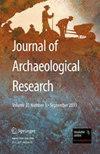巴尔米拉:古代世界的十字路口
IF 4.1
1区 历史学
Q1 ANTHROPOLOGY
引用次数: 0
摘要
近几十年来,叙利亚绿洲城市塔德摩尔(Tadmor),也就是我们所熟知的巴尔米拉,在罗马近东的学术研究中受到了最多的关注。新的证据和最新的研究让我们能够更好地了解帕尔米拉的许多方面,但同时也凸显出帕尔米拉本身以及更广泛的比较环境中缺乏综合公布的数据。在这篇综述文章中,我们将讨论近期研究对巴尔米拉城市发展、物质文化、宗教、环境、经济、身份和遗产的贡献,以及对我们理解罗马近东及其他地区更广泛动态的影响。本文章由计算机程序翻译,如有差异,请以英文原文为准。

Palmyra: At the Crossroads of the Ancient World
The Syrian oasis city Tadmor, better known as Palmyra, has received by far the most attention within scholarship on the Roman Near East over recent decades. New evidence and recent research allow us to better understand many aspects of Palmyra on its own terms, but it also has highlighted the lack of synthetically published data from Palmyra itself and from broader comparative settings. In this review article, we discuss the contributions of recent research on urban development, material culture, religion, environment, economy, identity, and heritage in Palmyra, as well as the implications for our understanding of wider dynamics in the Roman Near East and beyond.
求助全文
通过发布文献求助,成功后即可免费获取论文全文。
去求助
来源期刊

Journal of Archaeological Research
Multiple-
CiteScore
10.20
自引率
7.90%
发文量
9
期刊介绍:
Journal of Archaeological Research publishes the most recent international research summaries on a broad range of topics and geographical areas. The articles are intended to present the current state-of-the-discipline in regard to a particular geographic area or specific research topic or theme. This authoritative review journal improves access to the growing body of information and literature through the publication of original critical articles, each in a 25-40 page format.2-Year Impact Factor: 4.056 (2017) 5-Year Impact Factor: 4.512 (2017)2 out of 85 on the Anthropology listIncluded in the European Reference Index for the Humanities (ERIH) PLUS The European Reference Index for the Humanities and the Social Sciences (ERIH PLUS) was created and developed by European researchers under the coordination of the Standing Committee for the Humanities (SCH) of the European Science Foundation (ESF). https://dbh.nsd.uib.no/publiseringskanaler/erihplus/about/indexSCImago Journal and Country Rank (SJR) 2018: 1.7102 out of 263 on the Archeology (Arts and Humanities) list3 out of 254 on the Archeology list2 out of 131 on the General Arts and Humanities listSJR is a measure of the journal’s relative impact in its field, based on its number of citations and number of articles per publication year.Source Normalised Impact per Paper (SNIP) 2018: 2.112The SNIP measures contextual citation impact by weighting citations based on the total number of citations in a subject field. The impact of a single citation is given higher value in subject areas where citations are less likely, and vice versa.CiteScore 2018: 3.86Rated ''A'' in the Australian Research Council Humanities and Creative Arts Journal List. For more information, visit: http://www.arc.gov.au/era/journal_list.htm
SCImago Journal and Country Rank (SJR) 2011 1.227 Archeology 1 out of 96 Archeology (Arts and Humanities) 1 out of 59 Arts and Humanities (miscellaneous) 1 out of 243
 求助内容:
求助内容: 应助结果提醒方式:
应助结果提醒方式:


